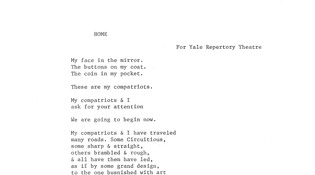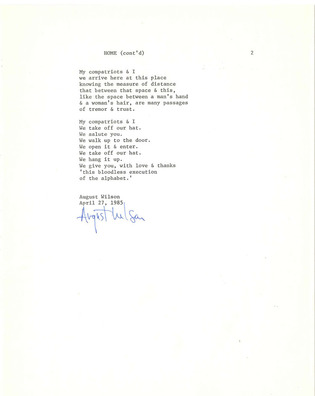 loading
loading
Arts & CultureAll roads leading homeAugust Wilson’s ode to the Yale Rep. Taylor Barfield ’16MFA is a writer and dramaturg.  Yale School of DramaView full image Yale School of DramaView full imageAugust Wilson (1945–2005) saw the typewriter as the ultimate symbol of being a writer. In an interview in 1988, he looked back on April 1, 1965, “the day that I bought my first typewriter with 20 dollars that my sister sent me. . . . I was 20 years old and I didn’t know how to type any. I plopped it down on the kitchen table. It took me 20 minutes to type my name, which was the first thing I typed. I wanted to see what it looked like in print. And that was my commitment to be a writer.” It was only natural that Wilson would take to his typewriter on April 27, 1985, to commemorate the world premiere of Fences, his second play at the Yale Repertory Theatre. Three days before the opening, he typed the poem “Home,” and dedicated it to the Rep (now celebrating its 50th year). He and Lloyd Richards, then artistic director, had begun their prolific partnership in 1984 with Wilson’s play Ma Rainey’s Black Bottom. He reached back to the years he had spent as a poet to deliver thoughts and feelings to the place that had become his artistic home. Wilson begins his poem by naming the “compatriots” that have accompanied him on his journey to Fences: “My face in the mirror. / The buttons on my coat. / The coin in my pocket.” The objects have traveled with Wilson down the “many roads” that have led “as if by some grand design, to the ones burnished with art / & small, irrevocable tragedies.” The roads, “some circuitous, some sharp and straight,” took him from Pittsburgh’s Hill District to Minneapolis to the Eugene O’Neill Conference and finally to the Rep and Lloyd Richards. We know now that Wilson’s road would lead him to seven more plays focusing on the history of black people in the United States during the twentieth century. It would lead to two Pulitzers, two Drama Desk awards, a Tony, and an enduring legacy. But in 1985, Wilson knew only that the road “burnished with art” had led him to Yale, “this place rich with welcome.” Fences is littered with references to the American pastime, and Wilson uses baseball as a metaphor again in this dedicatory poem. Just like a batter who has hit a home run, on his own artistic journey he found “a way home even at the start.” He found a way to remember his home, the Hill District, through his plays. Every published play that Wilson wrote after Fences took place in his childhood neighborhood during a different decade. All roads, especially those “burnished with art,” led Wilson and his “compatriots” back home, back to his roots.
The comment period has expired.
|
|